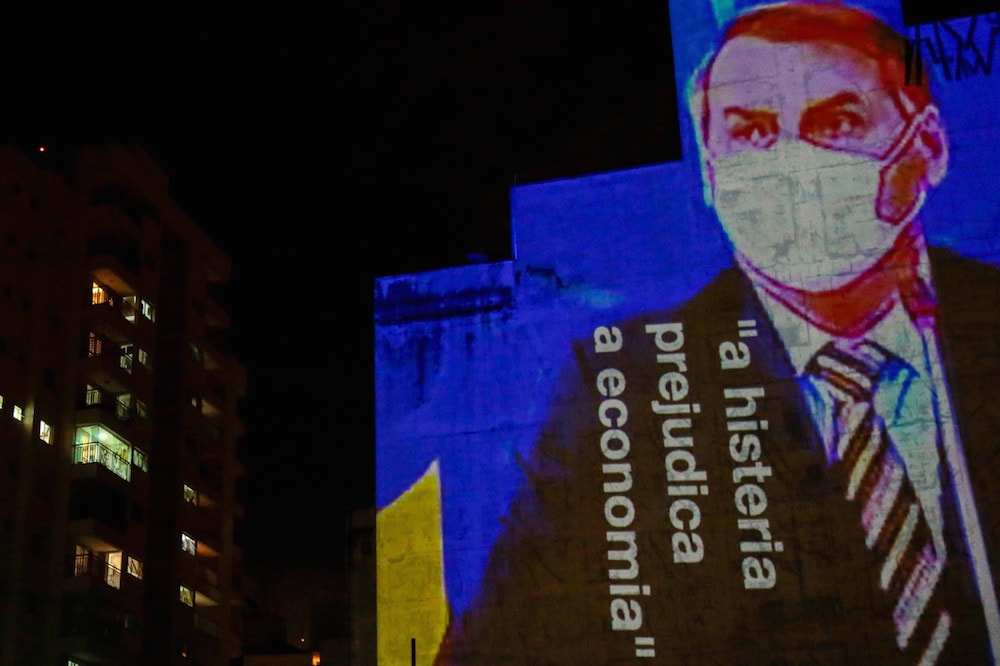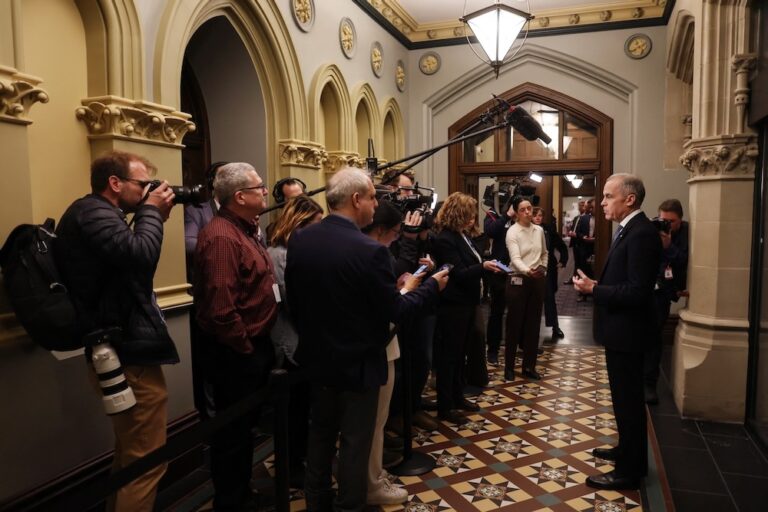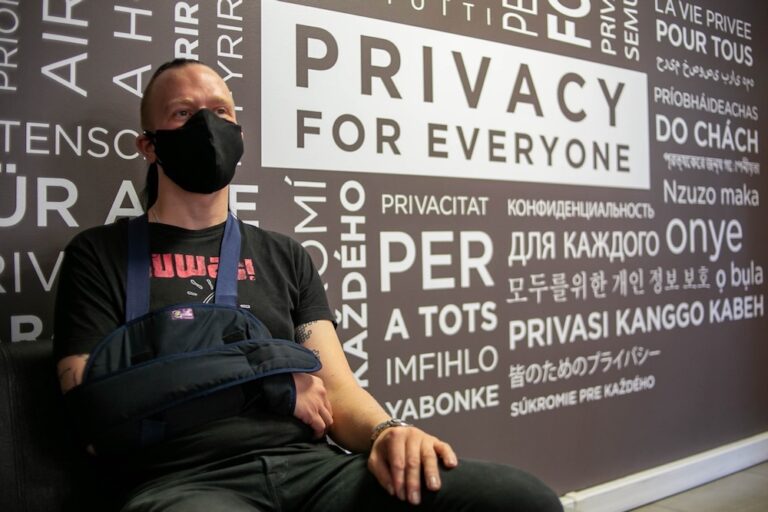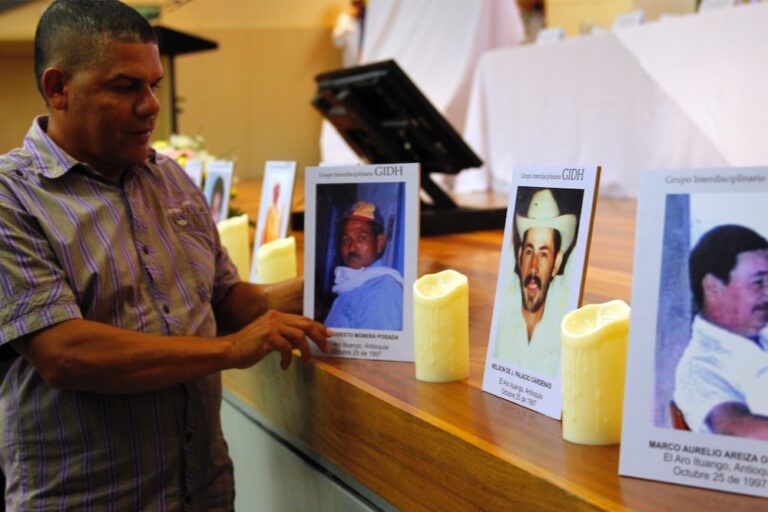March in the Americas: A free expression roundup, based on IFEX member reports and news from the region.
The first case of COVID-19 in Latin America was confirmed in Brazil, on 26 February 2020, rapidly followed by news of suspected cases in Ecuador, Mexico and Argentina. The virus arrived ‘late’ in Latin America, when the situation was already considered serious in China, Iran and Italy, and spreading fast elsewhere.
This meant that governments in the region had some time to prepare for the arrival of the coronavirus, the urgency of which specialists had already made clear. Preparations, however, were not a priority for all.
Some leaders – including Trump, Bolsonaro, López Obrador (AMLO) and Ortega – opted for denial, or downplayed the seriousness of the crisis. A very dangerous choice, since medical researchers and government officials from countries that were hit hard by the pandemic have highlighted the deadly impact of delayed action.
A recent study by the Imperial College London estimates that 1.3 to 40 million people could die worldwide from COVID-19. The difference comes down to “predicted mortality impacts in the absence of interventions or spontaneous social distancing with what might be achieved with policies aimed at mitigating or suppressing transmission.”
The arrival of COVID-19 in Latin America will have other enduring effects.
Currently, 95% of children in the region are out of school and, according to UNICEF, “[i]f school closure is further extended, there is a great risk that children will fall behind in their learning and we fear that the most vulnerable students will never return to school.” As for the economy, as described by The Economist, “[t]he virus has struck a patient that in economic terms has a serious pre-existing condition.” Annual economic growth in Latin America has been low; small businesses and an informal workforce represent a significant portion of the economy, and they will be disproportionately impacted by the recession that will most probably follow the pandemic.
The exacerbation of inequality is another concern; in an interview with El Pais, Eliana Silva, from Redes da Mare in Rio de Janeiro, stressed that the coronavirus will thrive on the reality of life in favelas; no space for social distancing in small houses with poor ventilation, and no access to urban infrastructure, such as running water.
Gender will also play an important role, both evidencing the gendered impacts of the coronavirus pandemic today and in the near-medium future.
COVID-19 also brings serious risks to democratic societies and to our human rights – including our right to freedom of expression and information. A quick tour around the region testifies to this:
Too little information and too much disinformation
The right of access to public information is not limited to information requests (FoIA requests, as they are known in some countries) presented to public bodies. It includes a broader state responsibility to proactively produce relevant information; disclose such information in a meaningful and easily comprehensible fashion; and create an informational context in which official data and news are seen as credible, relevant and accurate.
Despite this obligation, many countries in the region have struggled to provide comprehensive health information to their citizens, as indicated by different studies. The arrival of the coronavirus has intensified this problem.
In Brazil, for example, medical staff have pointed to a significant number of sub-notifications of COVID-19 in the country, not only due to non-tested cases, but also due to errors in the protocol and forms sent to hospitals and clinics at the beginning of the pandemic for the collection of data on deaths. Currently, discrepancy in the number of cases released by federal and state authorities has added to the uncertainty.
In Venezuela, according to IFEX member Espacio Público, the Ministry for Health ceased publishing epidemiological bulletins after 2014. While some bulletins slipped through in 2016 and 2017, the minister in charge was later dismissed – supposedly because the data showed a deterioration and an increase in the numbers of child mortality, malaria and diphtheria.
During the coronavirus crisis, public officials have been providing public statements about the pandemic, but the information released has been too general and outdated.
While the majority of countries in the region have adopted dedicated Access to Information Laws, many have now declared some type of ‘state of emergency’ and, consequently, suspended the timeframes for the processing of administrative procedures, including freedom of information requests. El Salvador, Mexico, Honduras and Brazil are some examples.
Modifications to the Access to Information Law in Brazil were introduced by a presidential decree that was severely criticized – including by IFEX members ARTIGO 19 and ABRAJI – for its vagueness, contradictions, and for disproportionately limiting the right of individuals to receive information during a public health crisis. Three days later, the decree was suspended by a ruling by the Brazilian Supreme Court.
The situation in Brazil is exacerbated by the amount of misinformation being circulated, especially through social media. Conflicting information has been released by different authorities, with the president and some of his supporters insisting on denying the seriousness of the pandemic. Bolsonaro has been refuting data released by other countries and by the World Health Organization. When questioned by journalists, he has attacked the media, accusing it of causing hysteria, and refers to COVID-19 as a media “trick” or “fantasy”.
In Honduras, paradoxically, despite limitations imposed on information requests, the government circulated internally a list with the names and personal data, including age and address, of the confirmed cases of infected individuals in the country. The list was leaked to the public. The incident demonstrates the poor standards applied in the handling of sensitive health information by the state, and constitutes a serious violation of those individuals’ right to privacy.
Censorship and abusive use of force
Honduras was another country to pass, through presidential decree, emergency legislation. Executive Decree PCM 021-2020 defined that constitutional guarantees should be suspended for seven days, including freedom of expression and the prohibition of censorship. IFEX-ALC jointly called for the revocation of such provision.
In Venezuela, local IFEX member IPYS Venezuela documented several cases where journalists were impeded from covering the state of COVID-19 in the country, including through disproportionate use of force. Some media outlets also received threats, and the governor of Falcón accused a media outlet in his region of terrorism.
Maybe one of the most paradigmatic cases so far has been the imprisonment of journalist Darvinson Rojas by the Bolivarian National Police on 21 March. Police agents initially claimed they were investigating a presumed case of COVID-19, but subsequently referred to tweets that Rojas had posted, reporting on the coronavirus outbreak. In addition to arresting Rojas, the officers confiscated the journalist’s equipment. His parents were also arrested, but were released after a couple of hours. On the night of 23 March, Rojas was charged with public incitement and hate speech, during a hearing in which the journalist was represented by a public defender assigned to him rather than his own trusted lawyers. On 27 March, IFEX-ALC demanded that the Venezuelan authorities immediately release Darvinson Rojas and drop the charges against him.
Privacy and the use of technology
Countries in the region have been struggling to protect both the right to information and the right to privacy, as evidenced by the Honduran case mentioned above. In Colombia, IFEX members Fundación Karisma and FLIP called attention to the potential risks to privacy imposed by a recent overly-broad rule approved by the Industry and Commerce Department that would allow some government agencies to request user data from telecommunication companies.
Indeed, it is in the realm of technology that this challenge has proven especially tricky – governments around the globe, as well as in the region, are resorting to applications and tracking devices to address the pandemic that may lead to a spur in surveillance, with potentially serious long-term implications.
On 20 March, a group of Latin American organizations, including IFEX members Fundación Karisma, Derechos Digitales, Asociación por los Derechos Civiles (ADC), and Red en Defensa de los Derechos Digitales (R3D), issued a statement in which they call attention to worrisome initiatives underway in Ecuador, Colombia, Chile, Paraguay and Uruguay. In addition to undermining people’s right to privacy, some of these initiatives have not even proven to be effective, and others could lead to the stigmatization of marginalized groups if applied without clear protocols.
The statement calls on states to consider that the use of digital technology to fight the pandemic should be subject to the standards of need and proportionality, in view of its possible negative effects on fundamental rights.
The other side of the coin – access to the internet
While some organizations are concerned with the abusive use of technology by governments during the COVID-19 outbreak, IFEX member OBSERVACOM reminded us of the need to ensure that people have internet and telecommunications access, to ensure the circulation of critical information and to avoid isolation. The organization has mapped several important initiatives. These include prohibiting disconnection due to insolvency, and efforts to ensure that the significant increase in online traffic caused by quarantine and social distancing can be supported.
Some resources
States are facing unprecedented pressure to respond to the spread of the coronavirus while maintaining their commitment to human rights. International and regional human rights authorities have reminded states of their obligations, including their duty to ensure the rights to freedom of expression, information and privacy.
On 27 March, the Inter-American Commission on Human Rights announced the launching of a Coordination and Rapid Response Room to ensure quick and concerted action during the COVID-19 pandemic. The Commission affirmed its intent to assist states in the protection and defense of human rights in the context of the crisis. The Room will collect and systematize information, as well as articulate and formulate proposals for decision-making by the Commission.
IFEX members in the Americas are producing some excellent resources to support the upholding of fundamental rights during the pandemic. Here are some of them:
- Periodismo en estado de excepción: cómo cubrir, a dónde acudir – Fundamedios
- Recomendaciones de cuidado para periodistas y trabajadores de medios durante la emergencia por COVID-19 – FLIP
- Guía del IPLEX para detección de noticias falsas en el marco del COVID-19 – IPLEX
- Coronavirus: cuidados para tu salud mental durante coberturas exigentes – IPYS
- Cómo cubrir el COVID-19 sin contribuir a la desinformación – IPYS
- Protege tus Videollamadas de Zoom – Fundación Karisma
- Cómo aprovechar los operadores de búsqueda de Google para corroborar noticias sobre el #COVID19 – R3D
- EFF and COVID-19: Protecting Openness, Security, and Civil Liberties
- Updates on the Coronavirus: PEN America Podcasts
- How are Internet Service Providers responding to the COVID-19 crisis? OpenMedia



